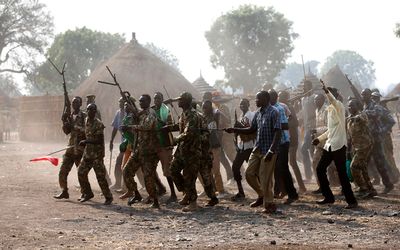China takes a hand in South Sudan as oil deal threatened
by Drazen Jorgic,
2014-06-06 08:23:44.0
JUBA — China is swapping its reserved diplomacy for a hands-on approach to help resolve a more than five-month-old rebellion in South Sudan that threatens Beijing’s oil investments.
The subtle change has been evident in months of faltering peace talks in the Ethiopian capital, where Chinese officials have been in regular contact with western diplomats to help regional African mediators push for a halt to fighting.
With China now Africa’s biggest trading partner, Beijing could face pressure to extend its new approach to other regions of Africa where it has growing economic interests.
South Sudan offers exceptional circumstances to prompt more proactive Chinese diplomacy: 5% of Beijing’s oil imports came from South Sudan when it was pumping at full tilt. The state firm China National Petroleum has a 40% stake in a joint venture.
China’s commercial interests are far greater than those of Western nations. This has prompted China to push rival factions loyal to President Salva Kiir and rebel leader Riek Machar to talk. It also led Beijing to halt negotiations over an arms deals with the government. China’s ambassador to South Sudan, Ma Qiang, told James Hoth Mai, then chief of the government army, that the arms deal was off shortly after the conflict erupted on December 15.
"(The envoy) said: ‘We cannot do anything now people are killing each other. We don’t want to contribute to that killing’," former commander Mai, who was replaced in May, recounted.
Senior western diplomats involved in mediation efforts, which have been led by the Intergovernmental Authority on Development (IGAD), a grouping of eight east African countries, confirmed there has been a change.
"The diplomacy of Beijing has clearly stepped up and is more proactive and more responsive now," said one of the diplomats, who traces the first sign of a shift to the row between South Sudan and Sudan in 2012.
China’s role was seen as crucial to ending the dispute that rumbled on for 15 months.
South Sudan’s oil output is now running at a third of the level it was in December before the latest conflict erupted, and is now hovering at about 165,000 barrels per day. Chinese workers were evacuated from some fields.
That has spurred China on. In another first for Beijing, United Nations (UN) peacekeeping chief Herve Ladsous said China planned to send a full battalion of troops to join the peacekeeping mission in Sudan.
The more assertive approach has been welcomed.
"(China) possesses substantial political, diplomatic and financial assets, which, if applied, would be a game-changer in the region’s peace and security," Kenyan President Uhuru Kenyatta said.
South Sudanese Foreign Minister Barnaba Marial Benjamin acknowledged that China was gaining traction on the continent, citing support for Africa on the UN Security Council. "This has given them respect in Africa," Mr Benjamin said.
Reuters

Rebels fighters gather in a village in South Sudan’s Upper Nile state. Picture: REUTERS
JUBA — China is swapping its reserved diplomacy for a hands-on approach to help resolve a more than five-month-old rebellion in South Sudan that threatens Beijing’s oil investments.
The subtle change has been evident in months of faltering peace talks in the Ethiopian capital, where Chinese officials have been in regular contact with western diplomats to help regional African mediators push for a halt to fighting.
With China now Africa’s biggest trading partner, Beijing could face pressure to extend its new approach to other regions of Africa where it has growing economic interests.
South Sudan offers exceptional circumstances to prompt more proactive Chinese diplomacy: 5% of Beijing’s oil imports came from South Sudan when it was pumping at full tilt. The state firm China National Petroleum has a 40% stake in a joint venture.
China’s commercial interests are far greater than those of Western nations. This has prompted China to push rival factions loyal to President Salva Kiir and rebel leader Riek Machar to talk. It also led Beijing to halt negotiations over an arms deals with the government. China’s ambassador to South Sudan, Ma Qiang, told James Hoth Mai, then chief of the government army, that the arms deal was off shortly after the conflict erupted on December 15.
"(The envoy) said: ‘We cannot do anything now people are killing each other. We don’t want to contribute to that killing’," former commander Mai, who was replaced in May, recounted.
Senior western diplomats involved in mediation efforts, which have been led by the Intergovernmental Authority on Development (IGAD), a grouping of eight east African countries, confirmed there has been a change.
"The diplomacy of Beijing has clearly stepped up and is more proactive and more responsive now," said one of the diplomats, who traces the first sign of a shift to the row between South Sudan and Sudan in 2012.
China’s role was seen as crucial to ending the dispute that rumbled on for 15 months.
South Sudan’s oil output is now running at a third of the level it was in December before the latest conflict erupted, and is now hovering at about 165,000 barrels per day. Chinese workers were evacuated from some fields.
That has spurred China on. In another first for Beijing, United Nations (UN) peacekeeping chief Herve Ladsous said China planned to send a full battalion of troops to join the peacekeeping mission in Sudan.
The more assertive approach has been welcomed.
"(China) possesses substantial political, diplomatic and financial assets, which, if applied, would be a game-changer in the region’s peace and security," Kenyan President Uhuru Kenyatta said.
South Sudanese Foreign Minister Barnaba Marial Benjamin acknowledged that China was gaining traction on the continent, citing support for Africa on the UN Security Council. "This has given them respect in Africa," Mr Benjamin said.
Reuters




















Change: -0.47%
Change: -0.57%
Change: -1.76%
Change: -0.34%
Change: 0.02%
Data supplied by Profile Data
Change: -1.49%
Change: -0.04%
Change: -0.47%
Change: 0.00%
Change: 0.08%
Data supplied by Profile Data
Change: 0.16%
Change: 0.61%
Change: 0.12%
Change: -0.29%
Change: 0.82%
Data supplied by Profile Data
Change: 0.25%
Change: -0.42%
Change: 0.20%
Change: -1.57%
Change: -0.96%
Data supplied by Profile Data